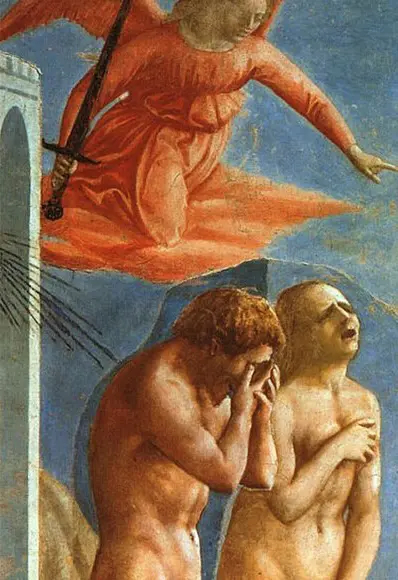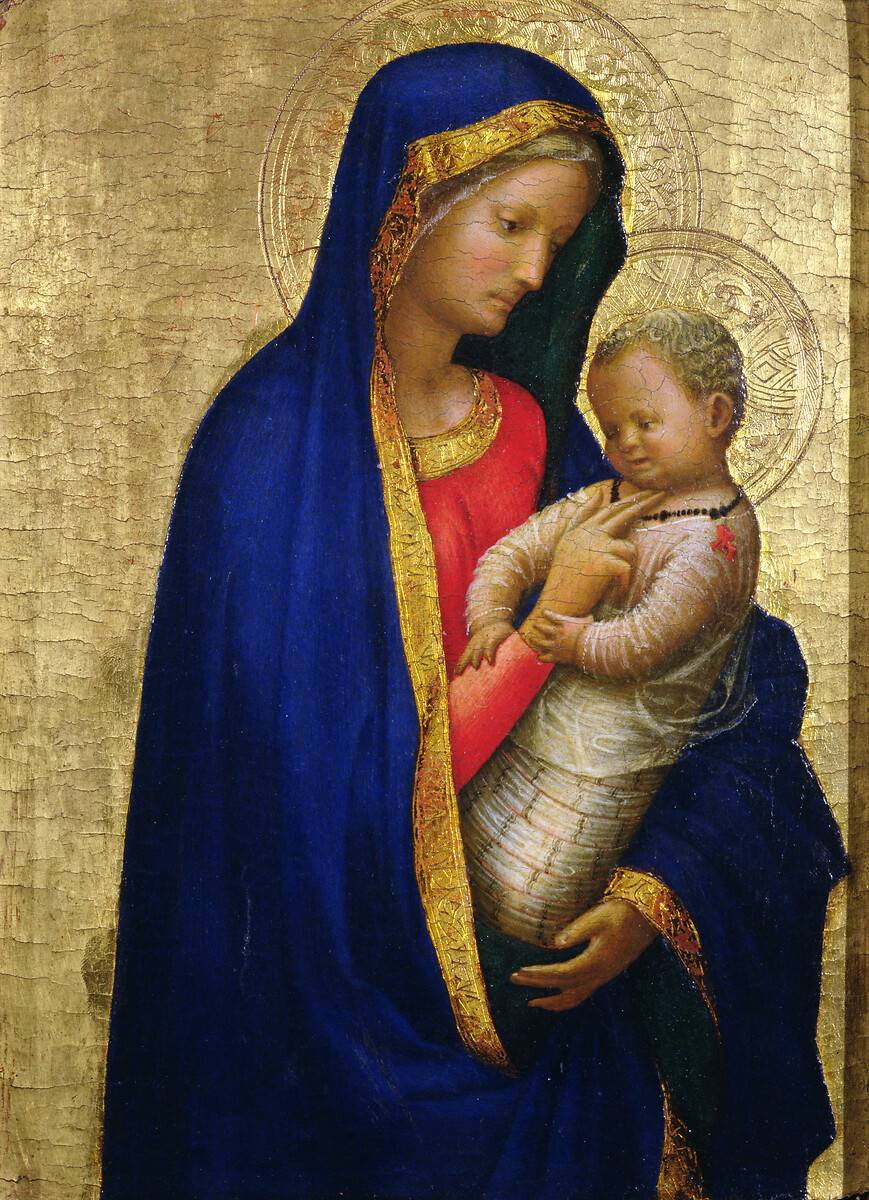The Advent Project: Week 1Sample

Dec. 2: Paradise Lost: Redemption Foretold

Expulsion from the Garden of Eden (Detail), Masaccio, c. 1425. 7' x 2'11 in. Fresco.
Brancacci Chapel, Church of Santa Maria del Carmine, Florence, Italy. Public domain.

Madonna Casini, Masaccio, c. 1426. Tempera painting on a gold panel, 24 x 18 cm. Uffizi Museum of Art, Florence, Italy. Public domain.
This is the Truth Sent from Above, from the album Christmas with Chanticleer and Dawn Upshaw.
Poetry:
“Where Are You?”
by Phillip Aijian
And so begins the odd phenomenon
of God asking questions that, clearly, He
always had answers to. But He goes on—
as if his call to them might merely be
to pass the time or to disguise his grief—
like a variation of hide-and-seek
might supply him with a moment’s relief
from the subject whose prospect was too bleak:
unhidden disobedience. All seen
even before her fingers grasped the skin,
before the honeyed words that passed between
the two of them; the dooming of our kin.
He saw the very moment when—if sight
correctly names perceiving their demise—
preference in the will bent left or right.
As if a tree, despairing of the skies,
forsook the sun to taste the lesser light
of nearby fire. Curving by degrees
it surrenders to the lifeless delight
of hissing flame. And though with smoke it pleas,
perhaps, to be withdrawn, we know its veins
forever closed and leaves forever brown.
New-burned by shame, with Eve Adam disdains
the garden for his shade. And with a frown,
with a stilling of breath, he turns his face
as if to hide—now such common recourse—
as if by hiding they might so erase
the spirit’s darker fact. And with what force
they strove to bury the burning knowledge:
even as God humbles himself to call,
husband and wife begin to blame and hedge,
growing more immune to the rise and fall
of their own hearts voicing prosecutions.
Perhaps the incarnation begins here—
as God submits to their diminutions,
asking permission to enter their fear.
EXITUS
The theme of exit and return is a powerful one in the Christian tradition, captured in the Latin phrase exitus-reditus. We see this pattern in the life of the God’s chosen people when they wander from him through disobedience, but he delivers them from their oppressors. Is there not a better image of exit and return than Israel’s exodus from Egypt? We also see this pattern in the life of Jesus Christ himself, in that he left heaven to become incarnate of the Virgin Mary to purchase salvation for sinful humankind but then returned to sit in glory at the right hand of God the Father. But the pattern of exit and return is not just the story of Israel and Jesus butthestory of fallen humankind, played out across the breadth of the Christian Scriptures. Adam and Eve sin against God and are expelled from the Garden of Eden. They “did eat, which was a sin, and thus their ruin did begin,” according to today’s hymn and vividly depicted by Masaccio’sExpulsion.
But their exit is only one half of the equation for there will be a return and that return is already depicted in Gen. 3:15: Eve’s seed “shall bruise your head, and you shall bruise His heel.” This text, the first utterance of the gospel of Jesus Christ (called the protoevangelium), foretells the return of humankind back to Edenic paradise wherein they will walk with God “in the cool of the day” (cf. Rev. 21-22). The old Eve will be recapitulated by Mary, the Mother of God, who is the new Eve, and the old Adam will be redeemed by the new Adam – Jesus Christ (1 Cor. 15:45).
Poet Phillip Aijian captures this exit-return motif well when he writes that “Perhaps the incarnation begins here.” Perhaps indeed! Theologically speaking, return always follows exit for it is God’s nature to redeem fallenness, to restore the penitent, to ransom the captive. For if there were only exit there would be no gospel, no hope, no Christmas. When humans rebel against God, we seek to hide from him, but he chooses to seek us out to return us to our former glory: “God submits to their diminutions, asking permission to enter their fear.” By entering, through the incarnation, into human history, God will return humankind to himself. The feast of Christmas is the first step on our return to God. He is calling to us, so let us respond in obedience to his call.
Prayer:
O God, who wonderfully created, and yet more wonderfully restored, the dignity of human nature: Grant that we may share the divine life of him who humbled himself to share our humanity, your Son Jesus Christ our Lord; who lives and reigns with you, in the unity of the Holy Spirit, one God, for ever and ever.
Amen.
Rev. Greg Peters, Ph.D., S.M.D.
Professor of Medieval and Spiritual Theology
Torrey Honors College
Biola University
Vicar of Anglican Church of the Epiphany, La Mirada
For more information about the artwork, music, and poetry selected for this day, please visit our website via the link in our bio.
Scripture
About this Plan

Biola University's Center for Christianity, Culture & the Arts is pleased to share the annual Advent Project, a daily devotional series celebrating the beauty and meaning of the Advent season through art, music, poetry, prayer, Scripture, and written devotions. The project starts on the first day of Advent and continues through Epiphany. Our goal is to help individuals quiet their hearts and enter into a daily routine of worship and reflection during this meaningful but often hectic season. Our prayer is that the project will help ground you in the unsurpassable beauty, mystery, and miracle of the Word made flesh.
More
We would like to thank Biola University for providing this plan. For more information, please visit: https://ccca.biola.edu/advent/2024









